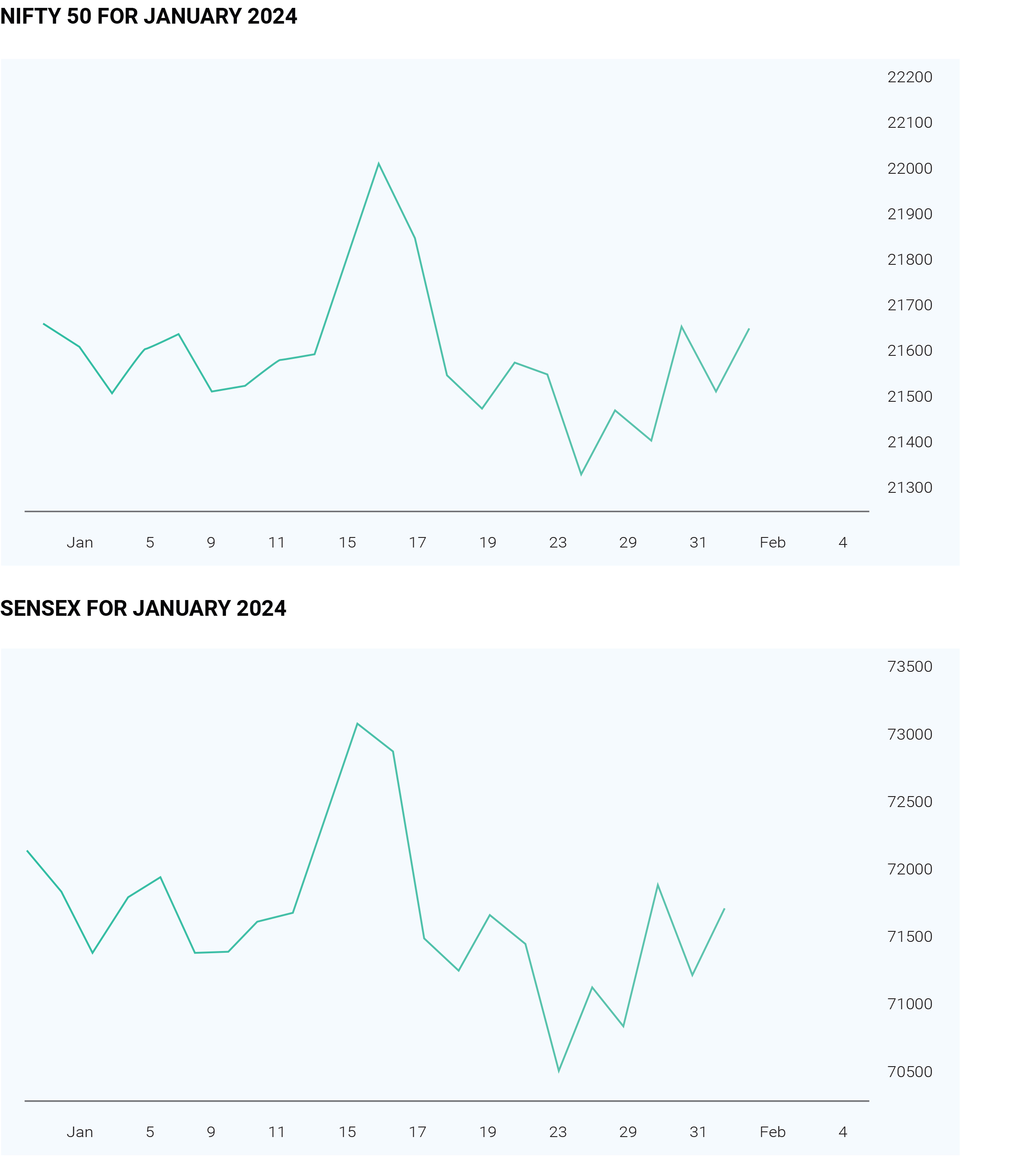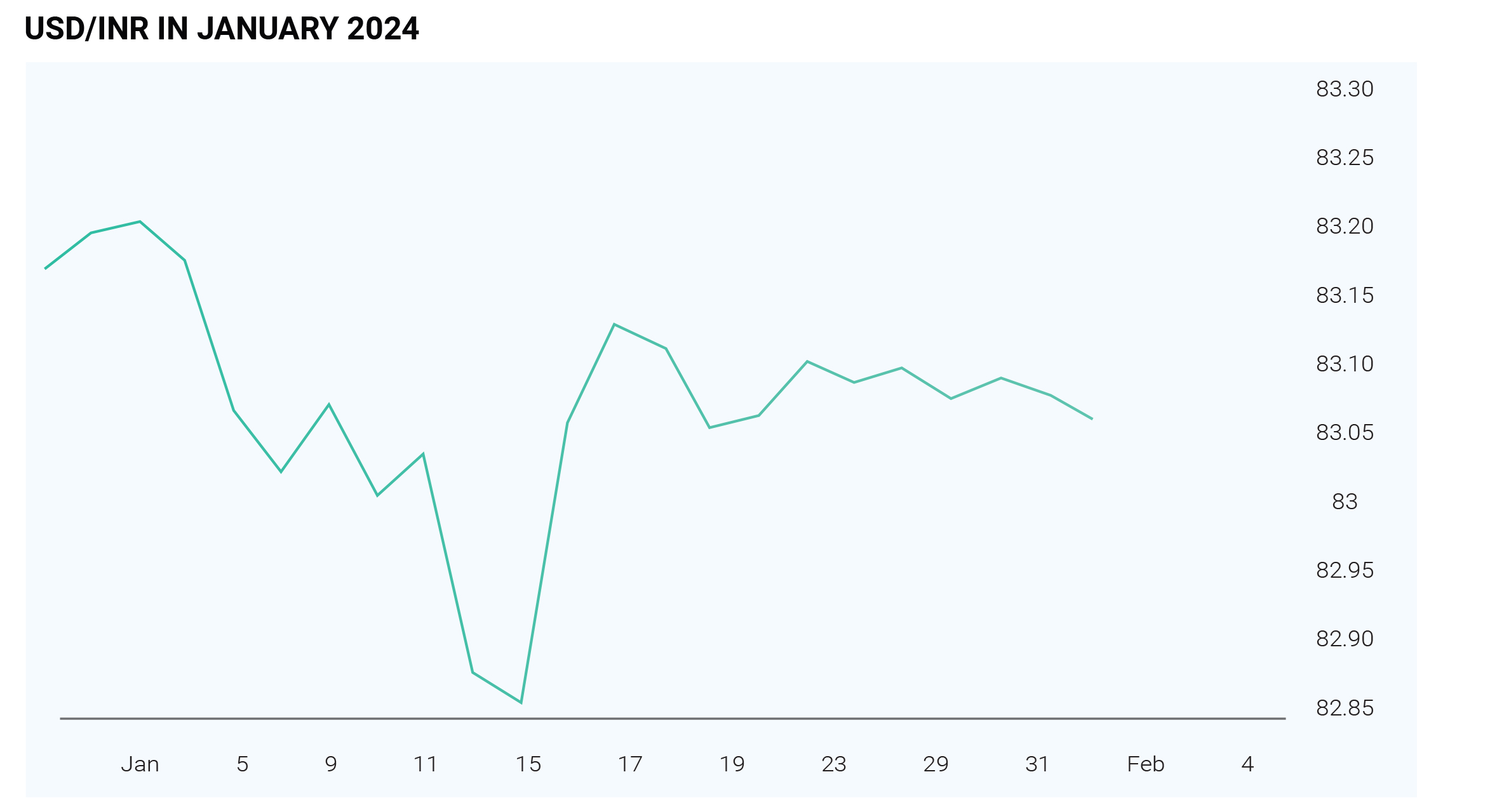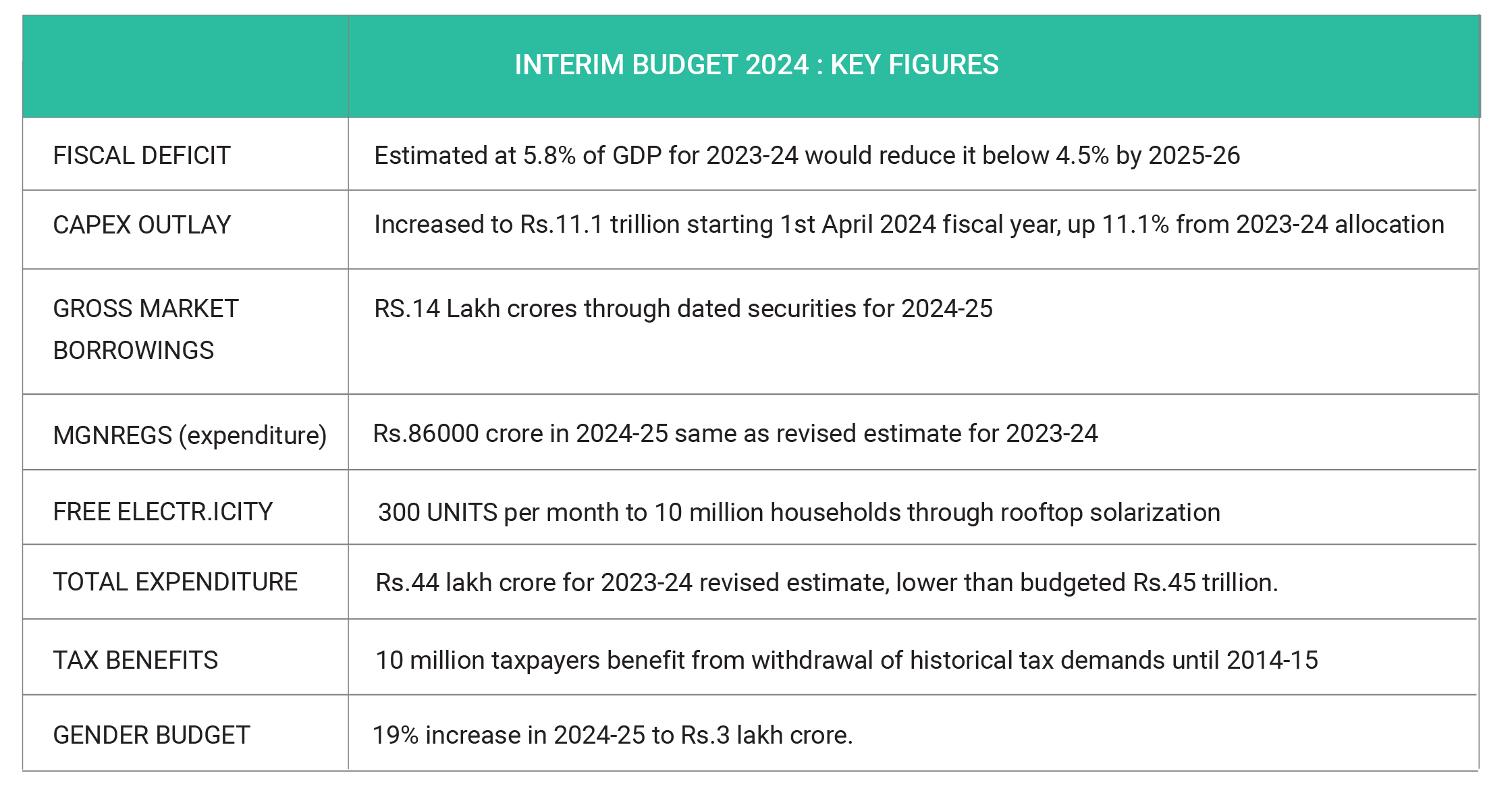The dawn of the new year in 2024 brought with it a sense
of hope and anticipation for investors, building upon the
excitement that characterized the end of December
2023. The global landscape, rife with uncertainties, and
the active economic measures taken by the current
government set the stage for a dynamic start to the year.
As economic numbers and corporate earnings painted a
promising picture, January 2024 saw markets reaching
all-time highs, only to experience a subsequent decline
by the end of the month. This rollercoaster ride was
marked by significant events that influenced both
domestic and international investors. The month kicked
off with a surge in market enthusiasm as economic
indicators and corporate earnings created an optimistic
atmosphere. However, this upward trajectory took a turn
towards the end of January, influenced by jittery investor
sentiment triggered by the corporate results of Q3 and
the interim budget expectations. Major sectors,
particularly banking and IT, witnessed profit bookings
and leading to a marginal 0.03% decrease in Nifty at the
end of the month, driven by global cues.
A pivotal moment occurred on January 17, 2024, when
the markets experienced a significant crash. The Sensex
plummeted by 1600 points, and Nifty saw a decline of
over 400 points, with Nifty Bank taking the hardest hit,
dropping by 2060 points in a single day. The following
day witnessed a further slide, with Sensex falling below
71000 and Nifty dropping below the 22000 mark. On
January 18, the Sensex recorded a decrease of 757.36
points, settling at 70,751.77, and Nifty faced a decline of
279.80 points, reaching 21,292.15. This volatile start to
2024 saw the market touch all-time highs on January 16,
only to touch all-time lows in the next two days. The
primary trigger for this crash was the stagnant Q3 results
of HDFC Bank. However, the market rebounded, with the
IT sector's corporate numbers reinvigorating investor
confidence, leading to the Sensex touching over 71500
points by January 19. The losses were offset by strong
December 2023 quarter earnings, coupled with hopes of
a rate cut in March.
Foreign Portfolio Investors (FPIs) played a crucial role in
shaping the economic landscape in January 2024. They
turned net sellers during the month, divesting Indian
equities worth ₹25,744 crore. This trend was spurred by a
rise in US bond yields, which triggered a sell-off in the
cash market. The debt market rally, initiated by the Fed
pivot, resulted in the 10-year bond yield falling from 5% to
around 3.8%. The recent increase to 4.18% aspected that
a Fed rate cut might only occur in the second half of
2024. This potential rate cut could attract FPIs back into
cash markets, especially to the Indian economy which
appears more promising than other developing
economies.
In the Indian debt market, FPI inflows continued since
April 2023, showcasing significant variations in equity
and debt segments in January. Equity witnessed net
selling of ₹25,734 crore, while debt saw net buying of
₹19,836 crores (NSDL). Factors contributing to these
trends include the rising US bond yields, high PE ratios in
the equity market (around 21 on estimated earnings),
and inclusion of Indian bond in the JP Morgan Bond
index, which attracted FPIs anticipating future profits.

Remarkably, the Indian Rupee emerged as the
top-performing Asian Currency in the forex market for
January 2024. Despite depreciation observed in other
Asian currencies, the Indian Rupee appreciated by 1% to
2%. The currency held stronger against the US Dollar,
appreciating nearly 0.1% in the dollar index. However, the
growth of the Indian Rupee is hindered by a stronger US
Dollar, preventing it from breaking below the 83
threshold. The Finance Ministry's review emphasized the
resilience of the Indian economy amid global challenges,
attributing it to robust domestic demand, investment-led
strategies, and macroeconomic stability.
The Indian government's ambitious projections envision
the country becoming the world's third-largest economy,
with a projected Gross Domestic Product (GDP) of $5
trillion over the next three years. Despite this positive
outlook, external risks such as sticky inflation, sluggish
global growth, and fiscal pressures in the global
economy, coupled with ongoing tension around the Red
Sea, pose potential threats. The Fiscal Budget 2024–25
aims to lower the fiscal deficit to 5.30% of GDP in
2024–25 from 5.90% in the current fiscal year. Welfare

spending is set to increase, with the government
targeting a 4.5% budget deficit as a percentage of GDP
by fiscal year 2025–26. As of January 29, India’s GDP
was estimated at $3.7 trillion, reflecting significant
growth from its position as the tenth-largest economy a
decade ago, with a GDP of $1.9 trillion.
Gold prices experienced volatility throughout January
2024, closing at lower levels. The Federal Reserve's rate
decisions played a pivotal role in determining the
movement of the Rupee against the dollar. In the third
week, gold prices fell as uncertainty surrounded the
Federal Reserve's interest rate cut cycle, closing at a
round 2036 USD/t.oz on January 31, 2024.
On the energy front, crude oil prices witnessed an
upswing in January due to global uncertainties. China's
economic slowdown, the collapse of China’s property
sector, ongoing conflicts in the Middle East, deteriorating
US-Iran conflict conditions, and OPEC's future decisions
on production plans all contributed to the volatility in
Brent crude prices.
The unveiling of the Interim Budget was met with positive
market reactions. The budget's focus on fiscal
consolidation, along with increased attention on sectors
such as infrastructure, railways, defense, green energy,
tourism, agriculture, and electric vehicles (EVs), garnered
favourable responses. The Fiscal Deficit target for FY25
was set at 5.1% of GDP, surpassing expectations, while
the FY24 target was revised down to 5.8%. Additionally,
the capex target of FY25 was increased by 11.1% to
₹11.1 lakh crore. Private capex cycles and rural spending
were emphasized in the budget. However, global factors
such as corporate earnings, monetary policy outlooks
from various central banks worldwide, election years for
over half of the world, and ongoing war conflicts
affecting commodities, are anticipated to impact
markets in the coming months.
Following the Interim Budget, bond yields moved
southward, prompting a surge in FPIs towards the debt
market. However, the equity markets are expected to
remain unstable in the next month due to prevailing
global uncertainties. The government's emphasis on
fiscal consolidation, coupled with increased focus on key
sectors, has resonated positively with market
participants, fostering a sense of confidence in the
economic trajectory.
The economic landscape of January 2024 showcased
the intricate interplay of domestic and global factors.
The rollercoaster ride experienced by the markets, from
record highs to significant lows, reflected the volatility
and uncertainty prevailing in the global economic
scenario. As investors navigate through these
challenges, the resilience of the Indian economy,
strategic policy measures, and global economic
dynamics will continue to shape the trajectory of the
financial landscape in the coming months.
On 31st January, the Reserve Bank of India (RBI) has
taken decisive action against Paytm Payments Bank,
barring the fintech giant from offering a range of banking
services. This includes accepting deposits and
processing payments, marking a significant setback for
one of India's prominent financial entities.
The roots of Paytm Payments Bank's woes can be traced
back two years when the RBI first raised concerns about
the interactions between Paytm's payments app and its
banking arm. Despite a lengthy timeline, the issues
remained unaddressed, leading to the recent regulatory
intervention.
June 18 : Regulatory Hurdles
Paytm Payments Bank faced its first regulatory obstacle
in June 2018, just a year after securing a banking license.
The RBI temporarily halted the opening of new accounts
due to violations of licensing conditions, including
breaches of day-end balances and non-compliance with
KYC guidelines. Although the ban was lifted by
December 2018, it set the stage for a series of
challenges.
October 2021: False Information and Monetary
Penalties
In October 2021, the RBI discovered that Paytm
Payments Bank had submitted false information,
resulting in a fine of ₹1 crore. This incident highlighted
the importance of accurate reporting in the financial
sector, emphasizing the need for transparency and
adherence to regulatory standards.
March 2022: Supervisory Restrictions
March 2022 saw the imposition of supervisory
restrictions by the RBI, citing lapses in technology,
cybersecurity, and KYC anti-money laundering
compliance. The directive included the immediate
cessation of onboarding new customers and the
appointment of an external IT audit firm to conduct a
comprehensive system audit.
October 2023: Continued Non-Compliance
March 2022 saw the imposition of supervisory
restrictions by the RBI, citing lapses in technology,
cybersecurity, and KYC anti-money laundering
compliance. The directive included the immediate
cessation of onboarding new customers and the
appointment of an external IT audit firm to conduct a
comprehensive system audit.
October 2023: Continued Non-Compliance
Despite these regulatory actions, Paytm Payments Bank
allegedly failed to take adequate corrective measures. By
October 2023, the RBI imposed a hefty monetary penalty
of ₹5.39 crore for persistent non-compliance with KYC
norms, citing various failures, including lapses in
video-based customer identification processes.
Current Status and Impact on Users:
As of January 2024, the RBI has directed Paytm
Payments Bank to halt new credit and deposit operations
after February 29 due to ongoing non-compliance and
supervisory concerns. Paytm users can continue to
accept or receive funds until this date, after which only
withdrawals or fund transfers from the wallet or bank
account will be allowed until the balance is exhausted.
For Paytm users, the implications include a restriction on
fresh deposits, top-ups, and certain banking services
from March 1, affecting fund transfers through AEPS,
IMPS, and UPI. Merchants using QR codes linked to
Paytm will need to migrate to new bank partners.
Business Impact and Future Outlook:
The repercussions for Paytm extend beyond immediate
financial penalties. The company's shares plummeted
following the RBI's actions, with a potential worst-case
impact of ₹3-5 billion on its annual EBITDA. The primary
focus for Paytm now lies in restoring regulatory
compliance, mitigating reputational concerns, and
ensuring a smoother path to resolution.
The Paytm Payments Bank saga serves as a cautionary
tale about the importance of regulatory adherence in the
financial sector.

Copyright © 2021 Fintso
